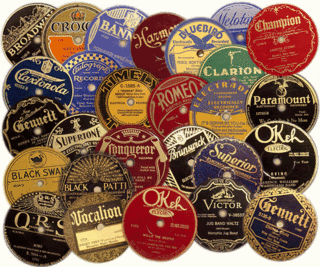
In Europe they were gearing up for another war. In America millions were still out of work. One industry that didn’t feel the effects of the Great Depression however was radio. As soon as radios and jukeboxes began playing swing, record sales increased exponentially. The embryonic big band sound first heard being played by the orchestras of Fletcher Henderson and Paul Whiteman was now reaching maturity by the mid 1930’s – and a lot of ears. As the music became more popular so too did the demand for more material. More compositions were being written down and sold. (This had the side effect though of frustrating a lot of musicians who became tired of playing the same things night after night.) People were saving their pennies to hear the bands that were criss-crossing the countries on one night stands. And they wanted to dance. Big bands were now becoming household names – names like Benny Goodman, Artie Shaw, Tommy Dorsey, Harry James and Glenn Miller.
"Swing music was an electrifying development in American popular culture. It... unleashed forces that, I think, people didn't know existed. There had been dance bands, sweet bands, sentimental bands. But when Benny Goodman reached those kids at the Palomar ballroom in California, it was like 20 years later with rock and roll... he was playing a swinging rough music that had been played in black communities for years. Ellington, you know, wrote It Don't Mean a Thing if it Ain't Got that Swing three years earlier and Chick Webb's band was doing it and Fletcher Henderson's... it swept the country. It was, it unleashed some kind of pent up...excitement and, and, and physicality that I think nobody was quite prepared for... And, also, this was the Depression. It was not an easy period. And this was a music that was just pure pleasure. Pure physical pleasure."
Gary Giddins.
The sound of jazz music was changing. Vocalists were coming to the fore. It was at this time that renowned vocalists like Billie Holiday and Ella Fitzgerald were becoming noticed. The music was becoming more refined and the solos employed were infinitely more expressive and colourful. The catalogue of talented musicians that emanated from this period is impressive. Their instruments were evolving and providing a rich palette from which they could express themselves – the drum was no longer a simple time keeper – Gene Krupa, Chick Webb and Buddy Rich saw to that. Trumpet players were mixing the influences of Louis Armstrong and Bix Beiderbecke to create their own sounds. The guitar was now becoming electrified and added another element to the developing sounds. Finally, the saxophone, once a novelty instrument was becoming the dominant one in the hands of Coleman Hawkins, Ben Webster, Johnny Hodges, Chu Berry and Lester Young.
I personally have mixed feelings about the music from this time. Some of the stuff that I’ve listened to and will expand on further in the blog is sublime. However for me 1930’s swing doesn’t tick all the boxes. Some of it hasn’t stood the test of time and there is a sense that some of it is rather corny. Like the films that came out of that era – you could watch some of them over and over again, whereas others haven’t aged well at all. The big band sound can, on its own, seem rather stuffy. However, on the up side, it did find a great home with vocalists, in my opinion. The Rat Pack sound of Las Vegas obviously finds its roots here and the likes of Sammy Davis Jr and Frank Sinatra optimised the big band feel in a way that their songs actually get better over time.
This was the period though that jazz was becoming truly adventurous.
No comments:
Post a Comment